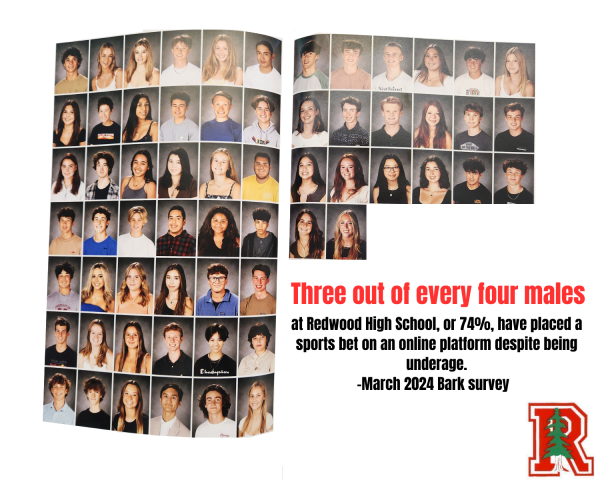An unprecedented experience: Using a fake ID in Marin
How privilege leads to false sense of security
It’s a Friday night, and a car full of teens pulls up to a dimly lit liquor store. Over their blaring music, the high schoolers argue about who will “buy up” – a term used to describe purchasing alcohol. Eventually, someone agrees and enters the shop with darting eyes. As they approach the cashier, their shaky hands reveal cash and a driver’s license listing a birthdate four years older than their own.
According to a March 2022 Bark survey, 20 percent of students own or have owned a fake ID. Despite the risks and often hefty price points, some students deem it worth it in order to buy alcohol and other substances or gain entrance to bars, clubs and additional 21-plus venues.
Student Dealers
As the saturation of those who own fake IDs suggests, there is a marketplace in which opportunistic students can make a profit. Charlie, a senior who wished to remain anonymous, has made thousands of dollars serving as a middleman between his fake ID-seeking peers and a factory in China’s Guangdong province.
Charlie says he has quickly learned the ins and outs of the lucrative business. He has placed orders in the span of two years without legal fault. With this experience, there is a swift, invariable nature in his transactions, he explains.
“‘Do you want a fake ID?’ They say ‘yes.’ And I’ll tell them, ‘Okay, it’s about $80.’ And I’ll say, ‘it comes with a free duplicate [and] it’ll scan on stuff,’ and they’ll say, ‘okay, cool.’ And I give [the factory] some money, and they give me an ID a couple [of] months later,” Charlie said.

The origins of Charlie’s interests are not layered. He hopes for these ventures to serve solely as a side revenue stream, an easy way to make a profit. And while Charlie mentions that the fake IDs he sells are scannable, a function that confirms their legitimacy, and passes the eye test at most liquor stores, quality is not his chief priority.
“I’ve been a hustler my whole life … I don’t work for other people. That’s not how I work. I am an entrepreneur. [Fake IDs are] just an easy way to make money into passive income,” Charlie said.
Preparing orders en-masse commands a certain level of business expertise, Charlie says. He cites his ability to minimize risk through the use of decentralized banking in his transactions.
“You can’t just send a PayPal of $1,000 or whatever to some dude in China. It doesn’t work like that, so I use secure payment methods like cryptocurrency,” Charlie said.
While his role as a middleman serves some value, Charlie acknowledges the disparity between the cost of the IDs and what he charges to those on his “orders.” He sees his margins as both a premium for his savvy techniques and a price inherent to the demand for fakes.
“You know, kids don’t know how much you’re actually paying for that shit,” Charlie said. “There are not a lot of suppliers. One could put themselves in a position to run a little bit of a profit. You’re setting the prices so you can [make] 80 to 100 dollars [off of] each kid.”
According to Charlie, his law-breaking business dealings are not what sets him apart from his peers. It is his willingness to take the initiative for a goal that would be otherwise achieved, relinquishing most feelings of remorse.
“Sometimes I do feel guilty … I would feel horrible if someone who I got a fake for got fucked up and hurt themselves or someone else with [the fake IDs] capabilities. But at the same time, those kids are going to get the IDs anyway,” Charlie said.
His assumption is correct; 32 percent of students feel that it would be very easy to obtain a fake ID if they wanted to, and 31 percent deem getting one somewhat easy, according to an April 2022 Bark survey.
Getting Caught
But what of the consequences? While the accessibility of fake IDs is well known, the risks of having false identification are seldom discussed. For some students, those with socioeconomic privilege, these risks can be almost entirely avoided. Senior “John” reports such an experience; he had his fake ID taken during a routine traffic stop. After being pulled over for speeding and using his phone simultaneously, the police officer asked John for his driver’s license. Upon retrieving it from his wallet, the officer noticed his fake ID.
“I went to look for my ID. Of course, I had two in there. I didn’t even pull it out, knowing that it was the wrong one, but she saw the pattern of the California state ID. And she basically asked me, ‘Is that a fake ID?’ I said ‘No.’ And she said, ‘Be truthful with me,’” John said.
Caught red-handed, John had no choice but to hand over his fake ID. The officer began questioning him about why he had the ID and where he got it. His answers, he admits, were less than truthful.
“I said, ‘Oh, uh, I don’t know, to get into concerts.’ Of course, I give the most innocent response. And then she said, ‘Yeah, are you going to bars or clubs?’ I said, ‘Yeah. I mean, not, not really because I feel like I still look too young,’ knowing that might not be fully true,” John said. “I said [I got it from] some website [and that] I got it for myself, not wanting to have to answer any questions about where I got it.”
To his surprise, the officer cited him, meaning that he would have to appear in court and answer a misdemeanor charge. When a few weeks went by, John’s mother reached out to the police department but didn’t receive a clear response about the proceedings of the citation. A month later, they received a call informing John that the department would not move forward with the citation and would seal the incident from his record, an important measure in protecting his college admissions, John noted. The police department explained that because John had good grades, their studies showed that it doesn’t help to continue legal action. Whether due to privilege or a simple lack of remorse, John explains that he only regrets getting caught, not possessing a fake ID – an attitude that reflects a broken culture within Redwood High School.
“I mean, to be honest, by having a fake ID, the only person you’re hurting is yourself,” John said.
Accountability
The handling of John’s case reflects the philosophy of Marin’s law enforcement towards youth criminal activity. Cassandra Edwards is a Deputy District Attorney (DA) for Marin County and Coordinator of the Juvenile Delinquency division and explains that her division functions differently than the adult system.
“The idea is that juveniles are to be rehabilitated and reformed by the community, whereas the adult system is considered to be punitive,” Edwards said.
This approach plays out in other situations regarding fake IDs as well. As of recently, the law surrounding prosecuting minors for possessing alcohol and tobacco has changed, altering law enforcement’s strategy along with it.
“When I first started [working for the DA’s office], you could charge a minor with a crime for possessing tobacco. Now, it’s the store owners that are charged with selling it. So the power dynamic has shifted,” Edwards said.
Store owners are often caught and charged through sting operations.
“There’s a lot of decoy and sting operations where people who are under 21, but over 18, go in and attempt to purchase alcohol and cigarettes and hold those stores accountable,” Edwards said. “[The sting operations] target the sellers of products because even if a kid has a fake ID, if no business is going to accept it or honor it, they’re not able to get anything out of it.”
As a result, the consequences of using a fake ID in Marin County have lessened for underaged patrons.
“I have not actually in all my years doing this independently charged someone for having a fake ID,” Edwards said.
Edwards believes this is because school administrators or police officers who find fake IDs simply confiscate them rather than employing other punishments. This trend in enforcement is also augmented by the approach of targeting sellers of tobacco and alcohol rather than those who possess the fraudulent means to buy them.
“Sometimes I will see it coupled with other things like the kid has been arrested for driving under the influence and, then within the inventory, there’s a fake ID that’s discovered. If something like that happens, I will generally charge it as its own independent offense,” Edwards said.
Reflection
Fake IDs are likely not something that will ever dissipate in popularity for the high school aged population in Marin. Not only will a continuation in culture promote this, but the privilege that students within Marin’s socioeconomic bubbles have will give credence to the unchanging nature of this issue. Still, the world of fake IDs offers all involved a date with risk. Inevitably, it is those who stand to profit the most who may lose the most. The heavy hand does not fall on Charlie or others who flood wallets with untruthful birthdates printed onto foreign plastic; instead, the house of cards will topple, and store owners will bear the burden of this ecosystem of fraud.


Taylor Elliott is a senior at Redwood High School and an Editor-in-Chief for the Bark. She loves matcha and her dog Ella. She also enjoys sailing, organizing...

Will Baker is a Copy Editor for The Redwood Bark. He enjoys surfing, mountain biking, and playing lacrosse when not in school.















